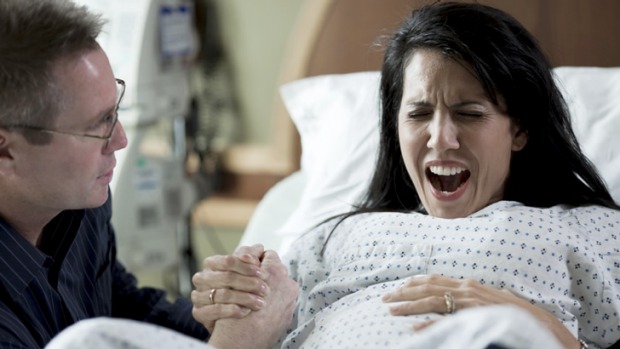
"I'm so sorry for all the swearing," I said to the two dedicated midwifes who helped me bring my daughter into the world.
My baby girl dozed on my chest, but amid the euphoria I was embarrassed. During the delivery I had cursed like a sailor; it wasn't just the odd F-Bomb, it was more like an F-Annihilation.
I’m not opposed to swearing now and then, in the right circumstances. But I'm certainly not a potty mouth, and I'm always careful about who I swear in front of. So where did my mid-labour profanity come from?
Psychology professor Dr Richard Stephens from Keele University has one explanation: he thinks that swearing actually helps to reduce pain.
Dr Stephens first noticed the link between swearing and pain when his wife gave birth to their daughter. “She swore a lot during the labour, particularly towards the end. She was really apologetic afterwards, but the doctor said that it happens all the time,” he explains.
Deciding to test the theory, Dr Stephens devised an experiment. A group of college students were asked to place their hands into ice-cold water for as long as they could bare it. One group were told to repeat a swear word of their choice, the other group were asked to repeat a non-offensive control word. Then the groups swapped round so that the non-swearing group became the swearers and vice versa.
In that group, 73 per cent of the participants were able to keep their hands submerged in the water when they were able to swear. On average, the ‘swearers’ were able to keep their hands submerged in the icy water for 30 seconds longer than the ‘non-swearers’.
Dr Stephens thinks that swearing can provide pain relief by provoking an emotional reaction that triggers a surge of adrenalin. “It is similar to the 'fight or flight' response,” he explains.
"Used in moderation, swearing can be an effective and readily available short-term pain reliever, if, for example, you are in a situation where there is no access to medical care or painkillers,” says Dr Stephens.
Registered midwife Lisa Berson has heard her fair share of swearing during the six years she has been delivering babies. “Swearing and cursing in labour, especially during transition, is quite common,” she says.
But Berson thinks swearing has more to do with stress relief than pain management. “Usually swearing is an outlet for the stress and frustration of labour,” she says.
“Most of it is directed at the partner/father of baby or at the midwife if the pain relief top-ups are not happening fast enough for their needs,” she notes.
Berson says that she doesn’t take it personally when labouring women swear, even when the swearing is directed at her, but it varies from person to person. “I know some midwives who do not agree with swearing, particularly if the women is aggressive,” says Berson.
Sydney mother Laura Baker says that she swore excessively during her labour.
“My husband was doing probably what all husbands do and offering words of encouragement such as ‘you can do this! Breathe! Relax’,” she explains.
“I just remember feeling an incredible rage and I let rip. Of course I can f-ing do this! But it really f-ing hurts.”
But did all the swearing help with the pain? Baker thinks so.
“I was surprised by how much I swore, but I think that it did help. It made me feel more in control of the situation,” she says. “Swearing like a trooper definitely made me feel better.”

Comments